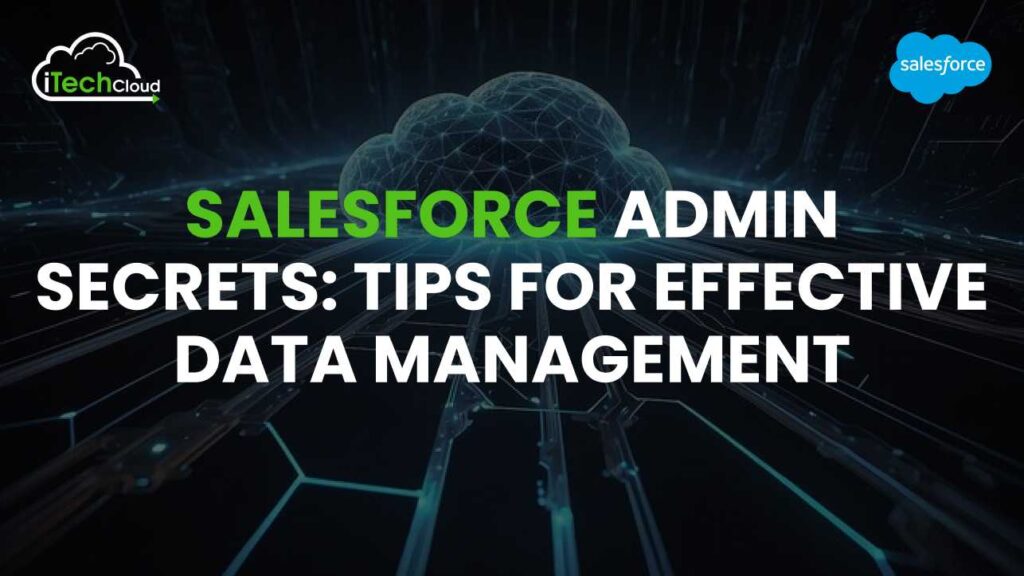Salesforce Admin Secrets: Tips for Data Management

Salesforce is a powerful CRM platform that helps businesses manage their customer relationships and streamline operations. data management within Salesforce is crucial for maintaining data quality, ensuring accurate reporting, and leveraging the platform’s full potential. In this blog.
Tips and best practices for Salesforce Admin Secrets.
Table of Contents
1. Understand Your Data Model
Why It Matters: The foundation of effective data management is a clear understanding of your data model. Salesforce data model comprises objects, fields, and relationships that define how data is structured and interrelated.
Key Tips:
- Map Your Data Model: Create a detailed map of your Salesforce objects and their relationships. This helps in understanding data flow and dependencies.
- Customize Thoughtfully: While Salesforce offers extensive customization options, avoid over-customizing. Stick to essential fields and relationships to maintain simplicity and efficiency.
2. Data Quality is Crucial
Why It Matters: High-quality data is essential for accurate reporting and decision-making. Poor data quality can lead to erroneous insights and ineffective strategies.
Key Tips:
- Implement Validation Rules: Set up validation rules to ensure data entered meets specific criteria. This prevents incorrect or incomplete data from being saved.
- Regularly Cleanse Data: Schedule regular data cleaning activities to remove duplicates, correct inaccuracies, and standardize data formats.
- Use Data Enrichment Tools: Integrate data enrichment tools to supplement your data with additional information, enhancing its completeness and accuracy.
3. Automate Data Management Tasks
Why It Matters: Automation reduces manual data entry errors, speeds up processes, and ensures consistency across the platform.
Key Tips:
- Workflow Rules: Use workflow rules to automate repetitive tasks such as sending notifications, updating fields, and creating tasks.
- Utilize Process Builder: Process Builder offers more complex automation scenarios, such as triggering actions based on specific conditions or creating multi-step processes.
- Explore Flow Builder: For advanced automation needs, Flow Builder provides a visual interface to design intricate workflows, including data updates, complex logic, and user interactions.
4. Manage Data Security and Access
Why It Matters: Protecting sensitive data and ensuring appropriate access is vital for compliance and security.
Key Tips:
- Define User Profiles and Permissions: Set up user profiles and permissions to control access to data based on roles and responsibilities. This helps in maintaining data security and integrity.
- Implement Field-Level Security: Control access to specific fields to ensure that users only see data relevant to their roles.
- Regularly Review Security Settings: Periodically review and update security settings to address any changes in user roles or data access requirements.
5. Optimize Data Storage and Performance
Why It Matters: Efficient data storage and performance optimization are crucial for maintaining a responsive and scalable Salesforce environment.
Key Tips:
- Monitor Data Storage Limits: Keep track of your Salesforce data and file storage limits to avoid running out of space. Archive or delete unnecessary records as needed.
- Use Indexing Wisely: Index fields that are frequently used in searches or filters to improve query performance.
- Optimize Reports and Dashboards: Design reports and dashboards to be efficient and relevant. Avoid overly complex queries and ensure that data visualizations are clear and actionable.
6. Regularly Backup Your Data
Why It Matters: Regular backups protect against data loss and ensure that you can restore information in case of accidental deletions or system failures.
Key Tips:
- Schedule Regular Backups: Use Salesforce’s native backup solutions or third-party tools to schedule regular backups of your data.
- Test Your Backup Restores: Periodically test restoring data from backups to ensure that your backup processes are effective and reliable.
7. Educate and Train Users
Why It Matters: Well-informed users are less likely to make data entry errors and more likely to use Salesforce effectively.
Key Tips:
- Provide Training Resources: Offer training sessions, documentation, and resources to help users understand Salesforce features and best practices.
- Encourage Best Practices: Promote best practices for data entry, such as consistent naming conventions and data formatting standards.
8. Monitor and Audit Data Usage
Why It Matters: Regular monitoring and auditing help identify and address potential issues before they become significant problems.
Key Tips:
- Use Salesforce Reports for Monitoring: Create reports to monitor data usage, identify anomalies, and track key metrics.
- Conduct Regular Audits: Perform periodic audits of data quality, user activity, and system performance to ensure ongoing effectiveness.
9. Stay Updated with Salesforce Releases
Why It Matters: Salesforce regularly releases updates and new features that can enhance data management capabilities.
Key Tips:
- Review Release Notes: Stay informed about new features and improvements by reviewing Salesforce release notes.
- Participate in Community and Training: Engage with the Salesforce community and take advantage of training resources to keep up with best practices and new functionalities.
10. Data Management Tools and Integrations
Why It Matters: Salesforce offers a variety of tools and integrations to streamline data management and enhance functionality.
Key Tips:
- Use Data Loader for Bulk Operations: Data Loader is a powerful tool for performing bulk data operations, such as importing, updating, and deleting records.
- Explore Third-Party Integrations: Consider integrating third-party tools for advanced data management needs, such as data cleansing, enrichment, and analytics.
Conclusion: Salesforce Admin Secrets
Data management is critical for maximizing the value of Salesforce and ensuring that your CRM system operates smoothly. By understanding your data model, maintaining data quality, automating tasks, securing data, optimizing performance, backing up data, educating users, monitoring usage, staying updated, and leveraging tools, Salesforce Admin Secrets can master data management and drive success in their organizations.

